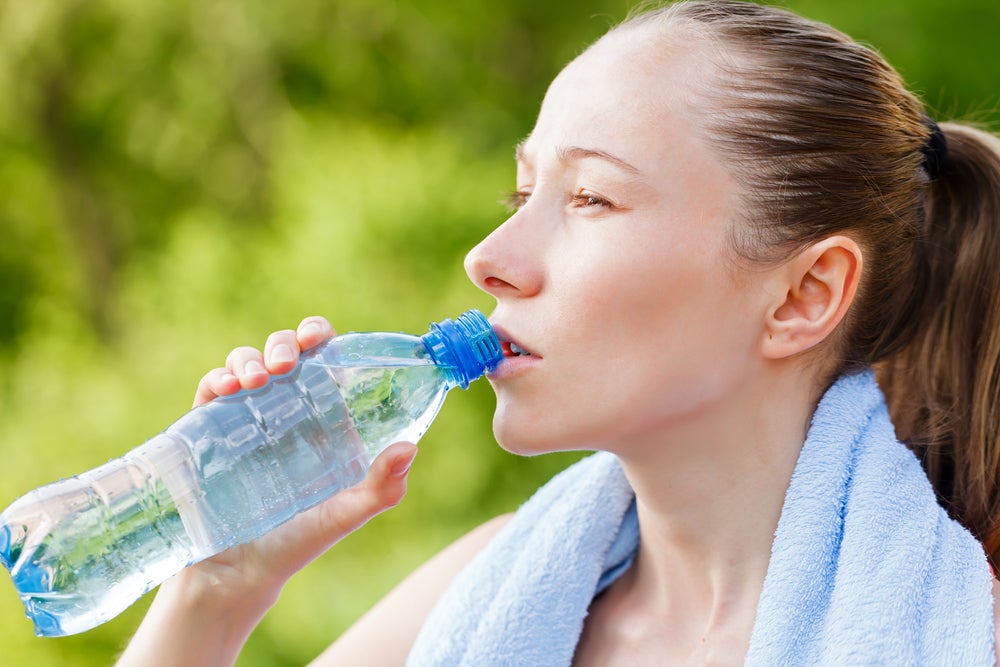There's A Difference Between Hydration And Fueling

Many runners make fueling and hydration more complicated than it really has to be. So, let’s clear up the confusion once and for all: what’s the exact difference between the two, and how can you use hydration and fuel to boost your performance?
It’s more than just merely food versus water. Fuel and hydration help boost the body’s performance during exercise, whether that comes from a liquid or solid. Your body tells you signs during exercise when your lacking one over the other. Running coach and exercise scientist Greg McMillan explains the difference between the two and how you can use each to boost your running performance.
Hydration equals the fluid levels in the body. “Humans are mostly water, and nearly all of the reactions in the body that keep us alive happen in an aqueous environment. Also, the fluid part of blood that circulates to deliver oxygen and nutrients and to remove waste products is mostly water,” explains McMillan. AKA, this is why you can only go a few days without water.
Fuel is your energy source—fats, carbohydrates and proteins. These are broken down to provide the energy you need to work, run and get through a hectic day.
How does fuel help your body?
Most of your energy needed for day-to-day activities and light exercise comes from fat. “Fat is our most efficient energy source because it offers more energy per gram than carbohydrates or proteins and has no negative by-products,” explains McMillan. Healthy carbs source about 90 minutes of energy needed for low-impact exercise or daily living before your energy starts to dwindle.
However, if you exercise at a higher intensity, then you lose energy faster, using up your carbohydrate fuel tank. “Our muscles use carbohydrates at a greater rate since it’s a faster acting fuel source than fat,” says McMillan, who also explains that protein can be a fuel source, but scientists suggest this is mainly with extremely long exercise. “The negative is that at high rates of breakdown, carbohydrate metabolism results in lactic acid build up. So at lower exercise levels, the only limitation of carbohydrate usage is how big the ‘tank’ is.”
Fuel also plays a major role in brain functionality. The brain likes glucose (carbohydrates). To keep the brain happy, you need to maintain a stable blood glucose level. McMillan explains, “Blood glucose is critical and its level is closely monitored, which is why we get hungry, then grumpy when blood glucose drops. The brain is stingy (thankfully) and will gladly cut your exercise level, cause the feeling of fatigue and increase your desire to eat to make sure glucose is available.”
How does hydration help your body?
Hydration helps circulate oxygen and nutrients throughout the body and also rids it of toxins. You need hydration to move the fuel you consume.
“Since most of our chemical reactions occur in aqueous environments and sweat loss is how we cool our bodies, we can see that if the body is dehydrated, these important tasks become compromised,” says McMillan. Everything from muscle contraction to body temperature maintenance stops operating properly, which can impact your exercise performance.
For races lasting less than an hour or 90 minutes in cooler conditions, no hydration is necessarily needed. However, for races lasting a long duration, even in that range, but in humid or hotter conditions, it’s recommended to drink two to three good swallows of fluids every 10 to 20 minutes.
“While the gut can’t always keep up with sweat loss while racing (and probably doesn’t need to), this intake of fluids helps slow dehydration and keeps the brain happy,” says McMillan.
You can also get hydration from certain foods, like fruits and veggies. Certain meats can also offer a level of hydration. “Luckily, the foods we should be eating are the ones that have the most fluids so another reason to eat the right things,” says McMillan.
